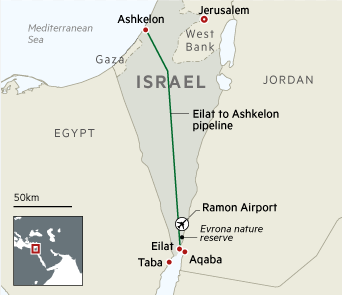- Home
- Prelims
- Mains
- Current Affairs
- Study Materials
- Test Series
The Ben Gurion Canal Project – To join the Red Sea with Mediterranean
Recently, there has been renewed interest in the Ben Gurion Canal Project, a proposed 160-mile-long sea-level canal that would connect the Mediterranean Sea with the Gulf of Aqaba, bypassing the Suez Canal.
|
Suez Canal
|
Ben Gurion Canal Project

- Historical Roots:
- Originating in the 1960s, the Ben Gurion Canal Project was conceptualized as a transformative infrastructure initiative.
- Named after Israel''s founding father, David Ben-Gurion (1886-1973), reflecting its historical significance.
- Strategic Objective:
- Aims to create an alternative maritime route connecting the Red Sea with the Mediterranean, bypassing the Suez Canal.
- Envisions reshaping global maritime dynamics by challenging Egypt''s monopolyon the shortest Europe-Asia route.
- Gulf of Aqaba to Mediterranean Coast:
- Proposes cutting a canal through the Negev Desert (Israel), starting from the Gulf of Aqaba (eastern arm of the Red Sea).
- Extends to the Eastern Mediterranean coast, providing an alternative trade route.
- The Gulf of Aqaba has a coastline shared by four countries: Egypt, Israel, Jordan, and Saudi Arabia.
- Economic Implications:
- Speculations suggest that Israel''s desire to control Gaza and eliminate Hamasis linked to unlocking economic opportunities tied to the canal.
- If completed, the Ben Gurion Canal Project would have a significant impact on global trade and geopolitics. It would create a new shipping route between Europe and Asia, bypassing the Suez Canal and reducing Egypt''s control over global shipping.
- Challenges and Viability:
- Gigantic logistical, political, and funding challengespose substantial obstacles.
- High complexity and prohibitive costs estimated to be as much as USD 100 billion.
- The imperative of political stability and the constant military threatas significant security concerns.
- Another challenge is the security situation in the region. The Gaza Strip is a potential security threat, and any canal would need to be protected from attack.
- Gigantic logistical, political, and funding challengespose substantial obstacles.
- Proposes cutting a canal through the Negev Desert (Israel), starting from the Gulf of Aqaba (eastern arm of the Red Sea).









 Latest News
Latest News
 General Studies
General Studies